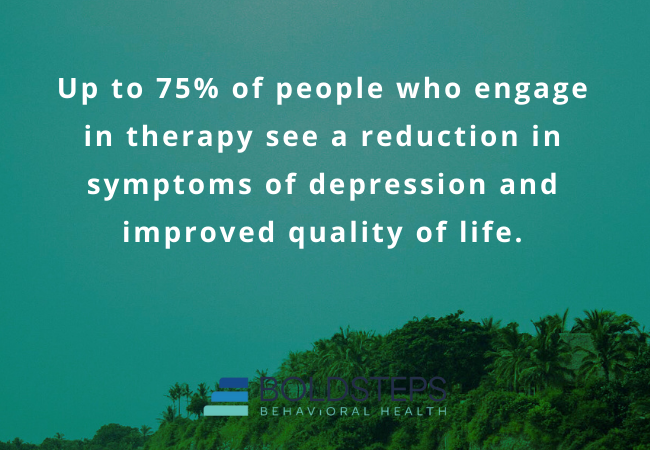Depression is often described as a heavy fog — a quiet, constant burden that clouds daily life. For many in New Hampshire, it can feel isolating and overwhelming. Yet, there is good news: effective treatment is closer than you think, and therapy plays a critical role in managing and overcoming depression.
At Bold Steps New Hampshire, we see every day how transformative therapy can be. Whether you’re participating in our Depression Treatment Program New Hampshire, exploring the structure of our Partial Hospitalization Program New Hampshire, or benefiting from the flexibility of our Virtual Treatment Program New Hampshire, therapy forms the foundation of lasting recovery.
This comprehensive guide will explore:
- Why therapy is essential in managing depression
- How therapy works (the science!)
- Types of therapy and their benefits
- How integrated care with anxiety treatment enhances outcomes
- The full range of treatment options for New Hampshire residents
- Life after therapy: staying well long-term
If you’ve ever wondered how therapy fits into your journey, you’re in the right place.
Understanding Depression: A Closer Look
Before we dive into the role of therapy, let’s understand what we’re up against. Depression is not a temporary mood swing — it’s a serious mental health condition affecting over 21 million U.S. adults annually (National Institute of Mental Health, 2023).
In New Hampshire, factors like seasonal changes, social isolation, and economic pressures can contribute to elevated depression rates. It’s vital to remember: depression is not a weakness or a character flaw. It’s a medical condition — and it’s treatable.
Symptoms of Depression Can Include:
- Persistent feelings of sadness or hopelessness
- Changes in sleep patterns (insomnia or oversleeping)
- Loss of interest in hobbies and social activities
- Fatigue or loss of energy
- Difficulty concentrating or making decisions
- Appetite or weight changes
- Thoughts of self-harm or suicide (Seek immediate help if these occur)
At Bold Steps New Hampshire, we are committed to early identification and prompt, compassionate intervention.
The Science Behind Therapy for Depression
Why does therapy work? Let’s look at the brain.
Depression is linked to chemical imbalances in neurotransmitters like serotonin, dopamine, and norepinephrine, which regulate mood and emotions. Therapy helps retrain the brain’s pathways, improving emotional regulation and stress response.
Modern neuroscience shows that therapy:
- Strengthens neural connections associated with positive thinking
- Reduces activity in brain regions tied to negative emotions
- Builds coping mechanisms that improve day-to-day function
- Teaches mindfulness and awareness, which reduces relapse risk
This is why therapy remains one of the most effective, evidence-based treatments for depression worldwide.
Barriers to Seeking Therapy — And How to Overcome Them in New Hampshire
Despite its proven benefits, many people hesitate to pursue therapy. Here’s why — and how Bold Steps New Hampshire helps overcome these barriers:
1. Stigma Around Mental Health
Unfortunately, mental health stigma still exists in many communities. At Bold Steps, we foster a compassionate, judgment-free environment to support open conversations about mental health.
2. Geographic Barriers
In rural parts of New Hampshire, access to therapists can be limited. Our Virtual Treatment Program New Hampshire eliminates this barrier, offering secure telehealth services statewide.
3. Cost Concerns
Many insurance plans cover therapy, including our Partial Hospitalization Program New Hampshire and Intensive Outpatient Programs New Hampshire. Our admissions team will work with you to verify benefits.
4. Time Constraints
With flexible scheduling in our Outpatient Treatment Program New Hampshire, and online options, we make therapy accessible even for busy individuals.
Types of Therapy in Depression Treatment
At Bold Steps New Hampshire, we customize therapy based on your needs. Some of the most effective therapies for managing depression include:
Cognitive Behavioral Therapy (CBT)
One of the gold standards for depression treatment. CBT helps you:
- Identify distorted thought patterns
- Replace negative thinking with realistic, positive thoughts
- Build coping strategies for future challenges
Dialectical Behavior Therapy (DBT)
Originally developed for people with intense emotions, DBT combines CBT techniques with mindfulness, distress tolerance, and emotional regulation.
Interpersonal Therapy (IPT)
IPT focuses on improving communication and relationship skills, recognizing that interpersonal stressors often exacerbate depression.
Mindfulness-Based Cognitive Therapy (MBCT)
MBCT combines mindfulness practices with cognitive strategies to prevent relapse and increase present-moment awareness.
Group Therapy
Peer support fosters connection, reduces isolation, and provides shared learning experiences. Group therapy is a vital part of our Intensive Outpatient Programs New Hampshire and Partial Hospitalization Program New Hampshire.
Family Therapy
Depression impacts not just the individual but also their loved ones. Family therapy builds understanding and strengthens the support system at home.
Combining Therapy with Medication Management
While therapy is powerful, some individuals benefit from a combination of therapy and medication, particularly in moderate to severe cases. At Bold Steps New Hampshire, our integrated approach includes:
- Psychiatric evaluation to determine medication needs
- Ongoing medication management alongside therapy
- Regular assessments to adjust treatment as needed
Medication can help balance brain chemistry, making therapy more effective. Together, they form a holistic treatment plan that addresses both biological and emotional aspects of depression.
Treating Depression and Anxiety Together: A Dual Approach
It’s estimated that nearly 60% of people with depression also have an anxiety disorder (ADAA, 2023). Ignoring anxiety symptoms can hinder depression recovery.
That’s why we offer Anxiety Disorder Treatment in New Hampshire, seamlessly integrated into our depression programs. Our therapists help you:
- Understand the link between anxiety and depression
- Manage anxious thoughts and behaviors
- Build resilience and emotional balance
Integrated care ensures you receive comprehensive support, no matter how complex your symptoms.
Levels of Care: Finding the Right Program for You
Partial Hospitalization Program New Hampshire
- Most intensive outpatient level of care
- Ideal for individuals needing daily, structured support
- Offers 5–6 hours of therapy per day, multiple days per week
- Includes individual therapy, group sessions, medication management, and skill-building
Intensive Outpatient Programs New Hampshire
- Offers flexibility for work, family, or school commitments
- Structured therapy multiple times per week
- Focus on coping skills, emotional regulation, and peer support
Outpatient Treatment Program New Hampshire
- Great for mild to moderate depression or maintenance after higher levels of care
- Weekly or bi-weekly sessions
- Focused on relapse prevention and ongoing support
Virtual Treatment Program New Hampshire
- Secure telehealth platform for therapy at home
- Ideal for rural residents or those with transportation barriers
- Flexible scheduling for busy lifestyles
At Bold Steps New Hampshire, we’ll help you find the program that best fits your needs and lifestyle.
What to Expect from Therapy at Bold Steps New Hampshire
When you begin your journey with us, here’s what you can expect:
- Thorough intake assessment to understand your unique situation
- Customized treatment plan blending therapies and medication management
- Warm, expert clinicians who guide you with empathy
- Safe, confidential environment — in-person or virtual
- Continuous progress monitoring to track improvement
- Aftercare planning to maintain recovery long-term
Addressing Stigma in New Hampshire Communities
One of the most common obstacles to seeking therapy is the fear of judgment. In small towns across New Hampshire, privacy concerns can feel magnified. At Bold Steps New Hampshire, we actively work to destigmatize mental health treatment by:
- Offering confidential services in person and online
- Educating communities about the importance of mental health care
- Providing support groups that foster open dialogue
- Treating every client with dignity, respect, and compassion
Seeking help is a sign of strength — not weakness.
Life After Therapy: Maintaining Mental Wellness
Therapy teaches you tools for life, not just for the moment. After completing your program at Bold Steps New Hampshire, we support your continued well-being through:
- Ongoing outpatient therapy or virtual care
- Medication management if prescribed
- Peer support groups and alumni networks
- Lifestyle coaching for nutrition, exercise, and stress management
- Relapse prevention strategies tailored to your life
Recovery is a journey, and we’re with you every step of the way.
Why Choose Bold Steps New Hampshire?
At Bold Steps New Hampshire, we are more than a treatment center — we are your partner in recovery.
- Full range of programs: PHP, IOP, outpatient, virtual
- Integrated care for depression and co-occurring anxiety disorders
- Compassionate, expert clinicians
- Flexible scheduling and telehealth options
- Personalized care in a supportive, stigma-free environment
Our mission is to help you regain hope, rebuild your life, and move forward with confidence.
Take the Bold Step Today
If you or someone you love is struggling with depression, don’t wait. Reach out today and discover how therapy can change your life.
Call Bold Steps New Hampshire at (603) 915-4223 to start your personalized path to recovery. Our compassionate team is ready to guide you through our Depression Treatment Program New Hampshire, Partial Hospitalization Program New Hampshire, Intensive Outpatient Programs New Hampshire, or Virtual Treatment Program New Hampshire. Together, we can take the bold steps toward healing and hope.
FAQ on Therapy for Managing Depression
How does therapy help treat depression?
Therapy provides tools to understand and manage depressive symptoms by addressing negative thought patterns, teaching coping strategies, and offering ongoing emotional support. At Bold Steps New Hampshire, our therapists help clients build resilience and create sustainable recovery plans.
What types of therapy are available at Bold Steps New Hampshire?
We offer a variety of evidence-based therapies, including Cognitive Behavioral Therapy (CBT), Dialectical Behavior Therapy (DBT), Interpersonal Therapy (IPT), mindfulness-based therapies, group therapy, and family therapy. Each approach is tailored to the client’s unique needs.
Can I access therapy if I live in a rural part of New Hampshire?
Yes! Our Virtual Treatment Program New Hampshire brings expert therapy directly to your home via secure, HIPAA-compliant telehealth services. This ensures that geography is never a barrier to getting the care you need.
What is the difference between PHP and IOP for depression?
Our Partial Hospitalization Program New Hampshire (PHP) offers daily, structured care for several hours a day, ideal for severe symptoms. Intensive Outpatient Programs New Hampshire (IOP) provide therapy several times a week, offering flexibility for clients balancing treatment with work or family life.
Does Bold Steps New Hampshire treat anxiety alongside depression?
Absolutely. Many individuals experience both conditions. Our Anxiety Disorder Treatment in New Hampshire is fully integrated with our depression programs to ensure comprehensive care and better outcomes.
Is medication used alongside therapy at Bold Steps New Hampshire?
Yes. In many cases, combining therapy with medication management offers the most effective results. Our clinical team evaluates each client’s needs and develops a personalized, balanced treatment plan.



